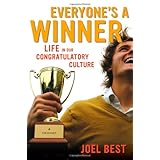
Average Reviews:

(More customer reviews)Author Joel Best, a professor of sociology at the University of Delaware, has written a very interesting book in which he addresses--but doesn't offer many conclusions about--a number of issues involving recognition and status in our modern society. His book, "Everyone's a Winner," is short (166 pages) and easy to read, and it best serves to get the reader thinking.
You can't help but notice all the awards of one kind or another that we see or hear about almost daily. On the one hand, Mr. Best describes a sandwich shop that has a wall fully covered with framed certificates denoting the shop's service of the best cheesecakes, hoagies, etc. On the other hand, some of his examples of "status affluence" must have involved some more detailed research. Did you know, for example, that the number of awards given to mystery novels has grown from less than 10 in 1946 to over 100 in 2009? Perhaps closer to mind would be the proliferation of college football "bowl" games.
When my younger son graduated from high school, his class had a dozen valedictorians. (I was amazed, but apparently this isn't so rare nowadays.) But is "a dozen valedictorians" a contradiction in terms? Of course, it's hard to rank students when a number of them have seemingly perfect grades. Indeed, Joel Best's university announced that it had over 500 new freshmen with GPAs above 4.00. Grade inflation is alive and well. As the author points out, the number of high-school students with "A" averages went from 7.7% in 1976 to 15.6% in 2006. But--and here is the important issue--are higher grades reflective of higher student performance or declining standards?
It's not unusual for teams of young soccer players to award a large number of trophies at season's end. Not every child is a soccer star, but can we make the case that a little self-esteem at a young age might go a long way toward a child's future enthusiasm and performance? There's another topic to chew on.
Best notes that commentator Michael Barone classifies the 6 - 18 age group as "Soft America," where accountability often takes a back seat to concerns with self-esteem. Yet Barone labels the 18 - 30 age group as "Hard America," where we play for keeps. Is the transition from one group to the next perhaps a lot for kids to handle?
Okay, hopefully you are getting an idea of the topics raised in this book. So, if you are interested in reading more about (and what follow are Best's terms) "status affluence, a self-congratulatory culture, prize proliferation" and what the impact of these trends may be on our culture, then I'd recommend you give this book some real consideration. The author does a good job distilling important concepts into straightforward discussion and, significantly, he leaves most of the conclusions to his readers.
Click Here to see more reviews about: Everyone's a Winner: Life in Our Congratulatory Culture
Every kindergarten soccer player gets a trophy. Many high schools name dozens of seniors as valedictorians--of the same class. Cars sport bumper stickers that read "USA--Number 1." Prizes proliferate in every corner of American society, and excellence is trumpeted with ratings that range from "Academy Award winner!" to "Best Neighborhood Pizza!" In Everyone's a Winner, Joel Best-- acclaimed author of Damned Lies and Statistics and many other books--shines a bright light on the increasing abundance of status in our society and considers what it all means. With humor and insight, Best argues that status affluence fosters social worlds and, in the process, helps give meaning to life in a large society.
Click here for more information about Everyone's a Winner: Life in Our Congratulatory Culture

0 comments:
Post a Comment